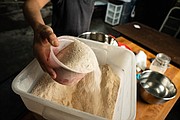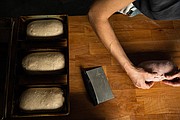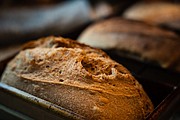Caroline Garrett’s love for food blossomed in her childhood, but it wasn’t until working at a wilderness therapy program in North Carolina that she realized the deep impact food could have on the body and the mind.
The home-cooked, unprocessed, made-from-scratch meals were a key element of rehabilitation, and eventually inspired Garrett to start her bread-making business, Sourdough Pursuit, to provide the same kind of nourishment for her community in Whitefish. She offers pickup and delivery of bread orders.
“They had a nutritionist there and a whole culinary program that was very focused on catering food to what that specific population of people needed. Everyone only got one cup of coffee and there wasn’t really any sugar in anything because caffeine and sugar highlight the same chemical pathways in your brain as drugs. That was the first time I opened my eyes to the whole other layer of food that I never even thought about,” said Garrett. “It was a really cool experience for me and sparked my interest.”
Using food as a treatment method for people helped Garrett to embrace the possibilities of food in her own life and in 2016, she created her own sourdough starter which she lovingly named Virgil — she has framed artwork of it around her house.
“I remember my roommate coming downstairs and I said, ‘Leah, I’m going to take us to the sourdough promiseland!’” Garrett recalled.
After seven years of experimenting, Garrett has learned she loves to incorporate vegetables, such as beets, carrots, peppers, and squash, into her breads. Other loaves she makes include a honey whole wheat, ancient grains, and rye. Though the process wasn’t so seamless at the beginning of her journey.
“I decided my first loaf should be a 100% rye loaf, which is something people work up to. I had no idea what I was doing and thought, ‘That looks easy.’ It was still edible, but it looked like tiny rye biscotti. It was the flattest pancake ever,” said Garrett.
While there are a few ways to make a sourdough starter, such as using potato flakes or soaked raisins, Garrett says her bread comes from a traditional starter. The process involves combining flour and water, mixing it, and keeping it in a fairly warm environment. The mixture captures wild yeast out of the air and eventually goes through a natural fermentation.
“You have to get rid of some of the mixture every day so it doesn’t bubble over. If I never got rid of some, I would probably have enough starter to take over the world,” Garrett said with a laugh.
In the future, Garrett hopes to travel abroad to extend her knowledge of bread-making with the top two countries on her bucket list being Georgia and Morocco.
“There are so many other cool varieties of bread that myself and a lot of other people don’t even know,” she said. “The country of Georgia makes some really cool, interesting bread and in Morocco, people make all their dough in their homes and then they go to the bakery to make their bread in the communal oven.”
While Garrett never intended on turning her hobby into a full-time business, as she continued growing, she realized the need people in her community had for simple, yet nourishing bread.
“My mom was recently in town and she said, ‘I still can’t believe that you bake bread because as a kid you would want the sandwich, but I couldn’t put it in between bread.’ But even as a kid, I knew that bread was garbage.”
Garrett explained that store bought bread can have around 30 different ingredients and condenses what should be a several day process of fermentation into a one to two hour time frame.
“I’m well aware that gluten can have repercussions for people who actually have allergies, but bread’s not the enemy. If you go to the grocery store right now and buy a loaf of bread, half of the ingredients you won’t even be able to pronounce and the flour they use is sprayed with pesticides.” said Garrett. “It could be the gluten that’s making people sick, but it could also be any number of these ingredients.”
In fact, Garrett said that several of her clients who are gluten-free or have celiac disease are able to eat her bread. She also keeps her ingredients organic and local by purchasing grain from Wicked Good Farms which is milled only a few blocks from her house.
“I like the simplicity of it. It’s a beautiful thing that’s been messed up over the years for convenience. And we all know what convenience is doing. It’s making people sick,” said Garrett. “It fills my heart when I hear someone say, ‘I can actually eat this bread.’ That’s why I do it.”
Orders can be placed on Sourdough Pursuit’s online ordering platform sourdoughpursuit.bottle.com. For questions or to learn more, call or text 406-612-1503.
Reporter Summer Zalesky may be reached at szalesky@dailyinterlake.com.



Source link
credite

